
Former racehorses can thrive in second careers once their life on the track is over – here’s Steve Dennis with five examples from various corners of the globe
‘He made me feel safe and brought my love of riding back straight away’
GB: Aureate
20yo gelding
Then: 69 races, 7 wins (Flat and jumps)
Now: riding club hack
Some folk retire to the countryside for a quiet life; Aureate has never been busier since relocating to the green heart of Somerset. It is some way removed from his early days winning races for Sheikh Mohammed and Mark Johnston, but it’s where he belongs.
“He appreciates the calm, ordered pace of life here,” says Marion Nieuwenhuizen, secretary of the Quantock Happy Hackers Riding Club near Taunton.
“He has been very well schooled and his quiet temperament and amenability in traffic makes him perfect for hacking. He loves his canters but will never just take off, and is very responsive to his rider. He is a well-behaved, generous horse with genuine manners, and is quite intuitive about his rider’s ability and confidence.”
Aureate – known at home as ‘Orio’ – has patrolled the Quantock Hills since 2017, adapting swiftly to the slower rhythms and the varied abilities of his riders, going out on the trail most days with whichever club member has booked him.
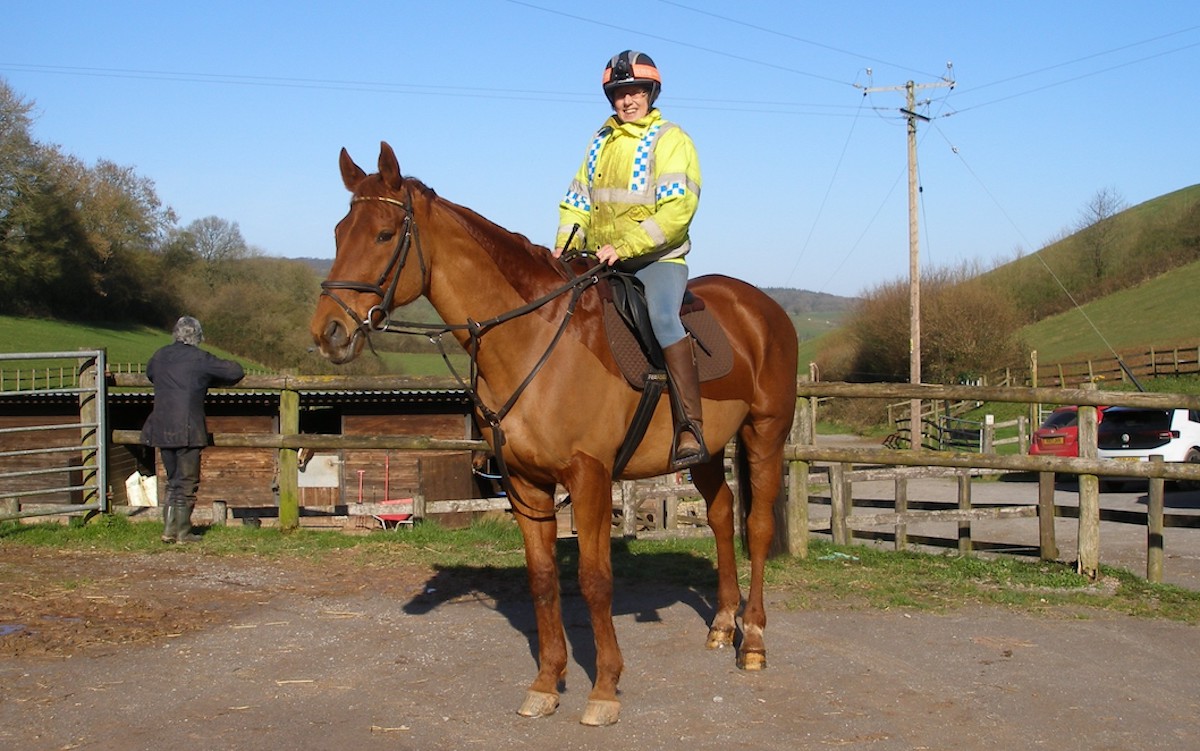
“He is an absolute gentleman,” says one such member, Nicky. “Having not ridden for many years I was quite anxious when I rode Orio for the first time, but he made me feel safe and brought my love of riding back straight away. I have a lot to thank him for.”
But it’s not all work for the Darley-bred gelding who once played a bit-part role in the biggest day of the British racing year, finishing third in a valuable handicap at Epsom in the race following the 2008 Derby.
“In summer the horses are turned out 24 hours a day, unless they’re out on a hack,” says Nieuwenhuizen. “They go out together as a herd, they have an enormous field to relax in, and Orio can enjoy just being a horse.
“The yard is owned by Sue Honeyball [mother of jumps trainer Anthony Honeyball], who has developed a well-defined routine. Orio and his friends are all waiting at the field gate in the morning and they walk into their own stables for their breakfast.
“On most days Orio is taken out on a hack, but he is also free-schooled in the arena and when jumps are set up he will happily jump them. And because he loves interacting with people, he is very much loved by all our members.”
As Aureate, he was ridden by Ryan Moore, AP McCoy and Johnny Murtagh. As Orio, he gives his current ‘jockeys’ the perfect day out.
“He was the first horse I rode when I joined the club and l loved him straight away,” says Siobhan. “He is so good and tolerant of so many riders and a really fun ride.”
The old boy still has that racehorse glide in his stride. “He surprises me with the speed and enthusiasm he shows, despite his age,” adds Heather. “Even now, he needs holding back when he gets the wind in his nostrils.”
‘Big, goofy gelding who takes everything in his stride’
USA: Bielefeld
7yo gelding
Then: 15 races, 0 wins
Now: war horse in battle re-enactments
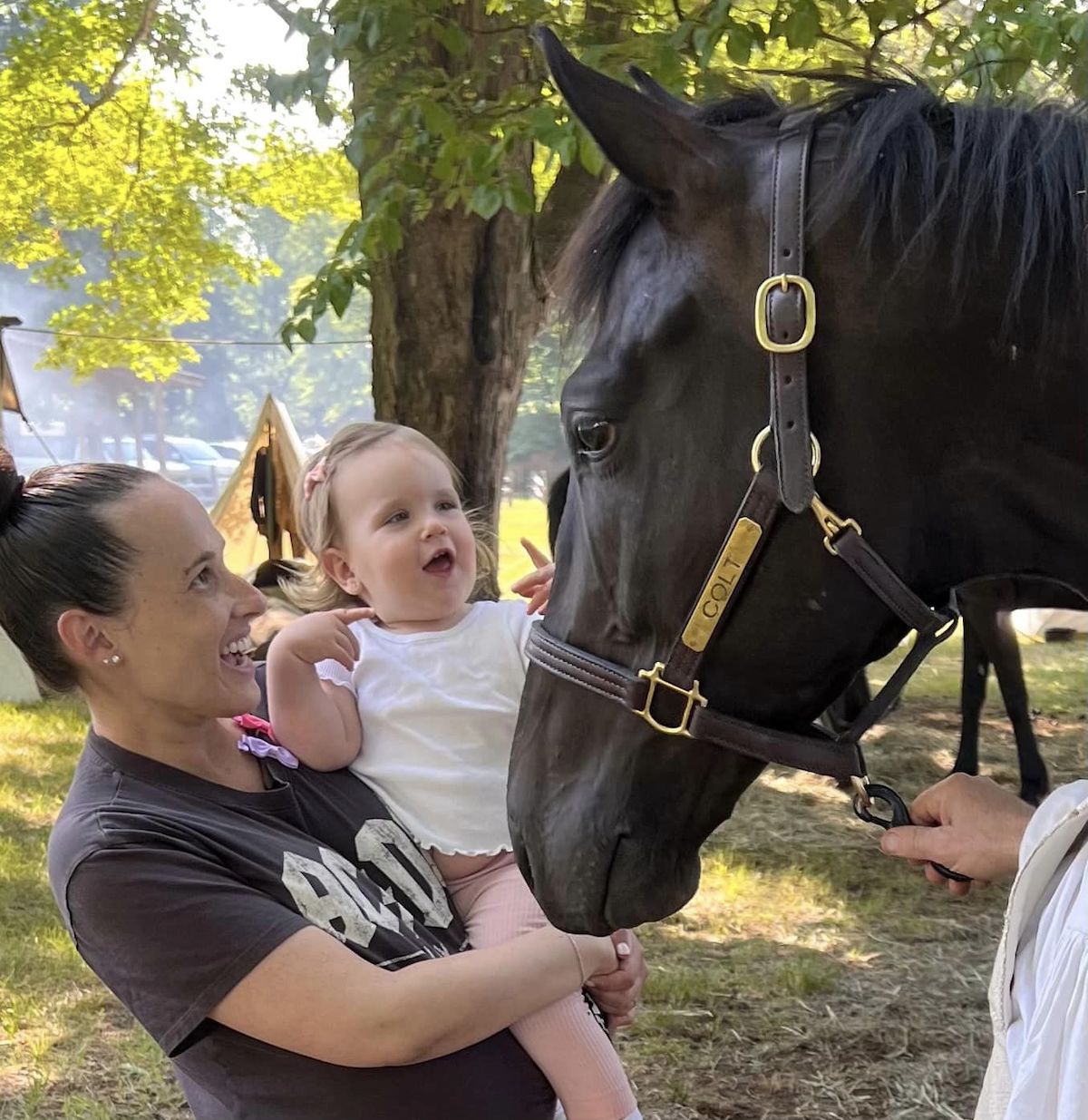 Sometimes a horse with an imperturbable character may be described as ‘bombproof’. Bielefeld takes this a step further – this war horse doesn’t bat an eye at cannons and musket-fire, let alone swords and hand-to-hand combat.
Sometimes a horse with an imperturbable character may be described as ‘bombproof’. Bielefeld takes this a step further – this war horse doesn’t bat an eye at cannons and musket-fire, let alone swords and hand-to-hand combat.
Bielefeld is an alumnus of New Vocations, a major racehorse adoption programme in the US founded by executive director Dot Morgan.
He found his way to Anne Raymond, an assistant trainer at New Vocations who was looking for the right horse to carry her husband Randy into the fray at Revolutionary War re-enactments in New York state.
Described as “a big, goofy gelding who takes everything in his stride”, Bielefeld adapted quickly to fighting the British – although occasionally, depending on the situation, he is required to switch allegiance and take on Washington’s finest. His easygoing nature makes him ideal for the unique demands of the battlefield, and Raymond is delighted with his progress.
“He’s still gaining confidence in the actual horse-on-horse combat, but everything else has been second nature to him. He takes very good care of my husband,” she says.
“I think my favourite thing about Bielefeld is his kindness to humans. He is never pushy when people come to say hello and he is so careful with children. I sometimes say he is kinder than he is smart, but that’s a compliment because he is truly very smart!”
Bielefeld’s racetrack owner-breeder Thomas Thienel named him in honour of his father, who came from the north German city. Thienel receives regular updates from New Vocations on Bielefeld, who raced exclusively on the New York circuit, hitting the board on three occasions at Belmont Park and Saratoga, and is thrilled about his old pal’s new role.
“I am so happy for Bielefeld and glad to see he is loving his work,” he says. “I wanted him to have a good life after his racing career.”
‘So good that he is examination standard for the Irish Pony Club’
Ireland: Briar Hill
16yo gelding
Then: 15 races, 6 wins (G1 Champion Bumper, G1 Navan Novices’ Hurdle)
Now: teacher, show horse
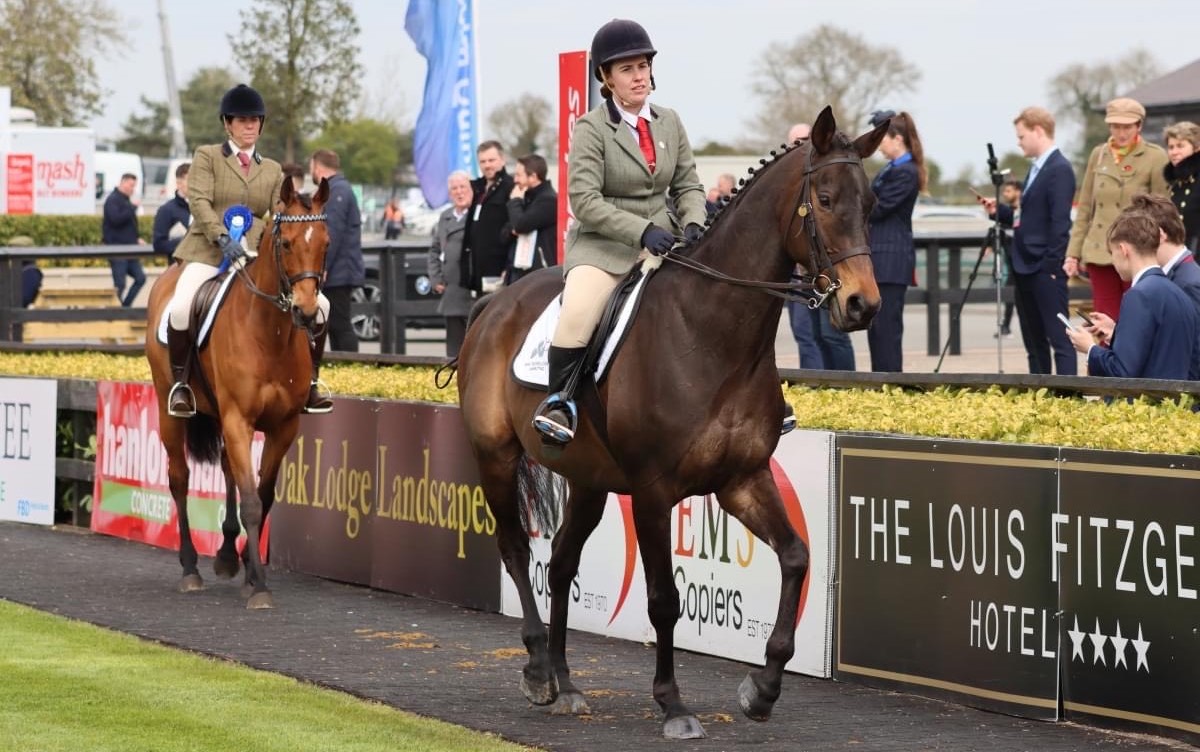 People train horses; horses also train people. The students at Grennan Equestrian College are getting the best education possible thanks to Briar Hill, the sort of teacher no-one ever forgets.
People train horses; horses also train people. The students at Grennan Equestrian College are getting the best education possible thanks to Briar Hill, the sort of teacher no-one ever forgets.
“He is invaluable to us,” says Bridgette McCarthy, course co-ordinator at the college in county Kilkenny, in the south of Ireland. “His stable manners are exceptional – he has a super temperament, is always very patient while students learn horse-care skills such as bandaging, is quiet to clip, and makes it very easy for students to learn lungeing.
“He’s become so good at that last discipline that he is examination standard for the Irish Pony Club and the British Horse Society.”
Briar Hill – once a shooting star at Willie Mullins’s all-conquering yard, a winner in bumpers and over hurdles and fences under Ruby Walsh – is owned by Corinne Doran, a former pupil at Grennan who knew he’d be the right kind of horse for the job. And when school’s out, he and Doran are busy making their way up the showing ladder, with their sights set firmly on qualifying for this year’s Royal Dublin Show.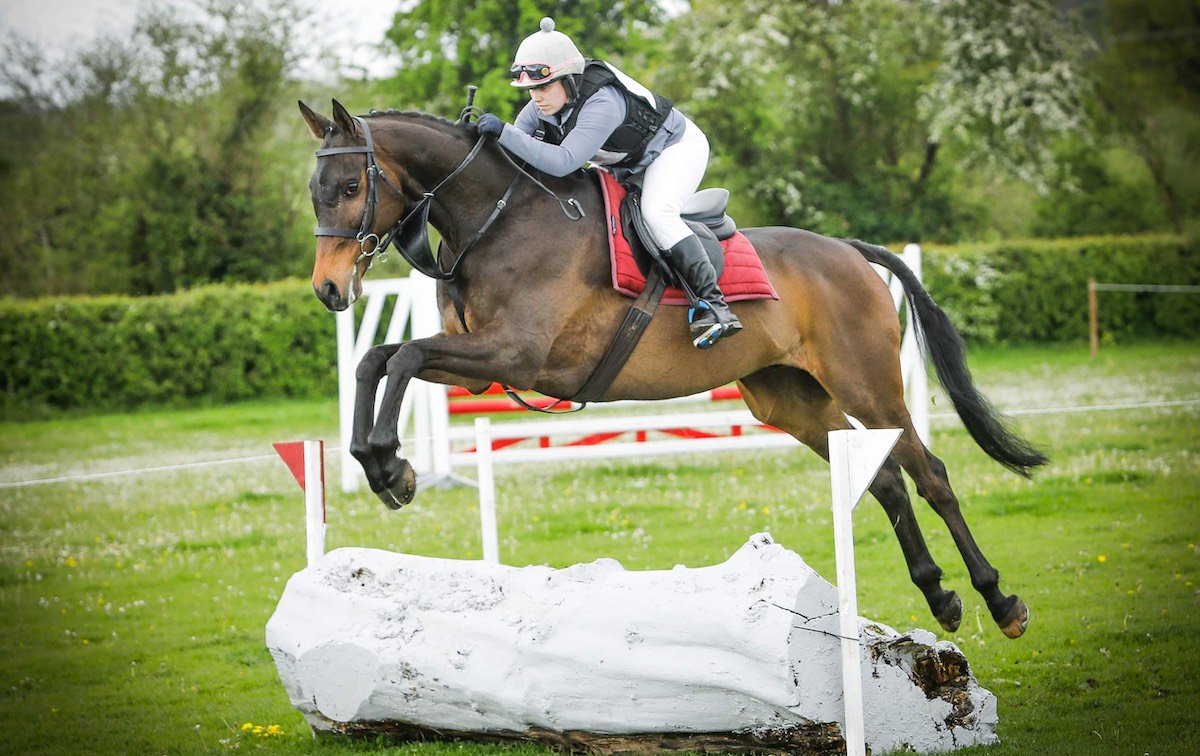
“He’s not fizzy, not too keen, so well-mannered and just the sweetest boy,” says Doran. “He’s so willing to learn new movements on the flat and over jumps, and is happy to just stand around and let you show the students how to tack up - he’ll do anything for a carrot or treat.
“I didn’t know what he had or hadn’t done in the two years between his retirement and when he came to me, so I started him as if he hadn’t had any retraining and he took to it very well.
“I was told by a friend who used to ride him out at Willie Mullins’s that he was always a nice ride, almost lazy and loved to pull up, so his head was in the right place for this kind of slow work.
“We’ve had so many great days out. He’d had some issues with water jumps and coffins for months, and one day all the hard work paid off in an event at our local club and he went clear.”
Briar Hill’s name is on the roll of honour of Mullins’s century of Cheltenham Festival winners; now Doran describes his dual role as a ‘win-win’, as he can keep in trim for his showing exploits while the students learn the ropes.
“He can work with our advanced students, with less experienced riders, and is a favourite with transition year students who have never ridden before,” adds McCarthy. “He is a much-treasured part of our team.”
‘Perfect example of the Thoroughbred’s versatility’
Australia: Chapter And Verse
9yo gelding
Then: 31 races, 6 wins (G3 George Moore Stakes, Doomben)
Now: eventer
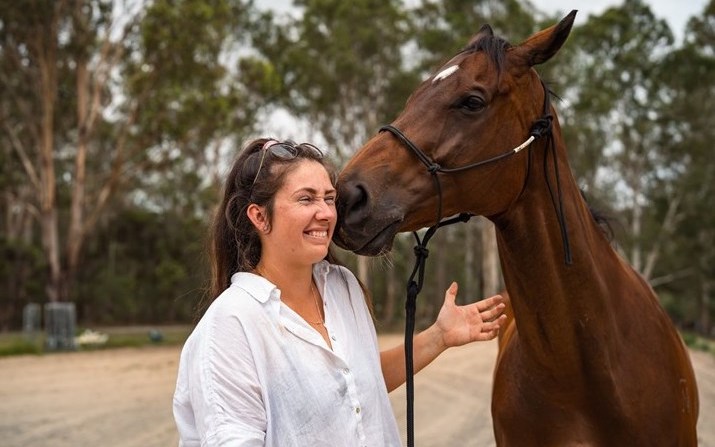 He earned more than a million dollars on the track and now the penny is starting to drop for Chapter And Verse in his new role as an eventer, after his retraining at the Transitioning Thoroughbreds Foundation in Queensland, Australia.
He earned more than a million dollars on the track and now the penny is starting to drop for Chapter And Verse in his new role as an eventer, after his retraining at the Transitioning Thoroughbreds Foundation in Queensland, Australia.
“Off-the-track Thoroughbreds transition really well,” said his new owner Tylah Webley, a former work-rider who has two other ex-racers – Other Way (29 races, no wins) and Silverbrook Lad (33 races, 1 win) – at her set-up south of Brisbane, quoted in an interview with Racing Queensland.
“Some take longer than others, but they all come around. I’ve christened him ‘Macca’ and he’s a straightforward ride, quiet and easy to take out.”
Chapter And Verse (sorry, Macca) spent three months at the TTF with retrainer Kate Dreverman and experienced all sorts of new disciplines, the process intended to bring out any hidden talents that could point to a new career.
“Eventing is where I want to go with him and he has taken to it well,” adds Webley. “The first event we went to was at Toowoomba and he was leading after the dressage, but the cross-country section was cancelled because of rain. We’ll slowly move up the grades and he’s doing great.
“He loves his new mates and the three of them are always running around, playing around. He’s a happy horse and we’ll have a lot of fun together.”
Queensland has become a shining light of the retraining and rehoming industry, and success stories like Macca demonstrate the opportunities for ex-racers when they move on to the next chapter.
“It’s fantastic to see Chapter And Verse excelling in his life after racing,” says Kim Duffy, senior animal care manager at Racing Queensland. “He’s a perfect example of the Thoroughbred’s versatility, demonstrating the range of post-racing pathways that are available.”
‘Children are much more comfortable opening up emotionally with a horse’
Canada: Crimson Deed
16yo mare
Then: 20 races, 1 win
Now: therapy horse
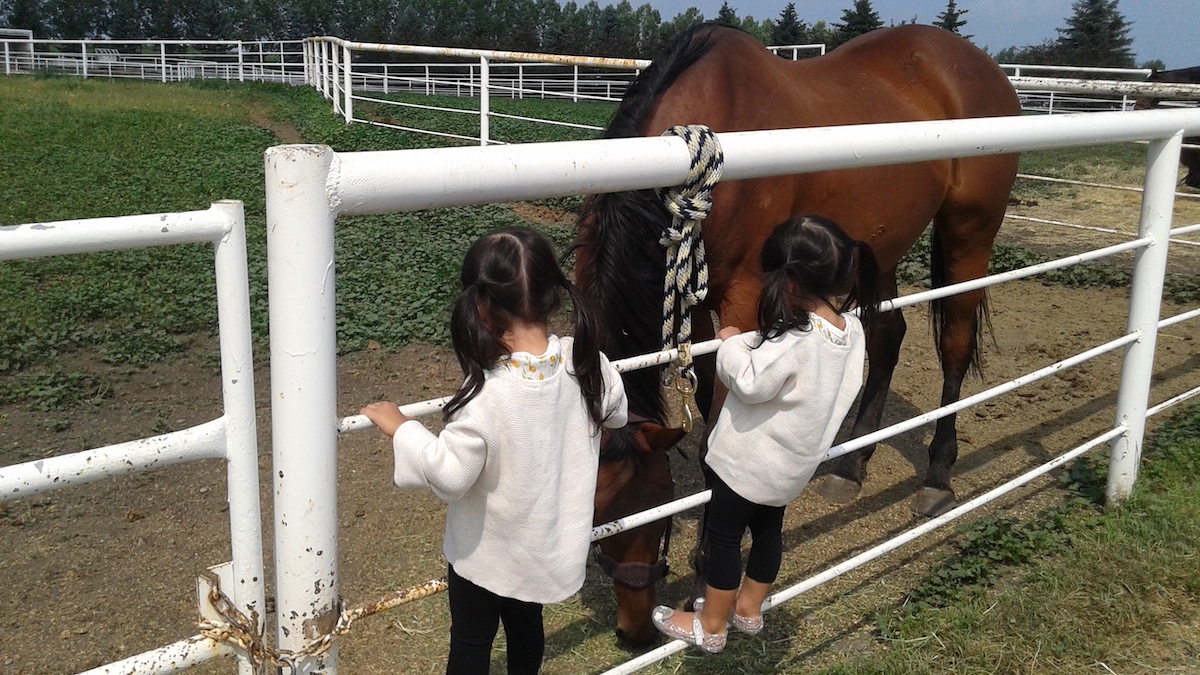 Many ex-racers compete for cups and rosettes, but Crimson Deed’s successes are more nuanced and more rewarding, underlining the maxim that the best thing for the inside of a human is the outside of a horse.
Many ex-racers compete for cups and rosettes, but Crimson Deed’s successes are more nuanced and more rewarding, underlining the maxim that the best thing for the inside of a human is the outside of a horse.
Crimson Deed is a therapy horse at the practice of Dr Brenda Abbey, a cognitive child psychologist specialising in helping neurodivergent children with complex learning, communication and attention challenges. Abbey, based near Calgary in western Canada, bred Crimson Deed and raised her from a foal after she was orphaned at two months, and that bond has been integral to their therapy work.
“I have owned and bred racehorses for 30 years and have woven my off-track Thoroughbreds into my experiential work,” says Abbey. “When I retired Crimson Deed from the track, she became a broodmare as well as a therapy partner for children and families in my private educational practice.
 “Connection and trust with the horse is essential for any equine-assisted therapy, and this was easy for me and Crimson Deed as I was part of her life from the beginning. Children are always interested in the horses’ back-stories.
“Connection and trust with the horse is essential for any equine-assisted therapy, and this was easy for me and Crimson Deed as I was part of her life from the beginning. Children are always interested in the horses’ back-stories.
“Thoroughbreds are well suited to the therapy role because they are highly intelligent, and due to their backstretch experiences with grooms and exercise riders they are very attached to people, they find it easy to create connections with people.”
Abbey runs two programmes – Healing With Horses and Literacy and Communication with Thoroughbreds – that provide help to children with ADHD, autism, learning disabilities, anxiety and expressive communication challenges.
Interaction with Crimson Deed, whose lone racetrack success came at longshot odds in a six-furlong maiden at Northlands Park, provides an experience that is very different from conventional ‘office’ therapy.
“Like all horses, Crimson Deed doesn’t judge,” says Abbey. “Non-threatening relationships develop between horse and child, increasing their confidence.
Brushing horses provides rhythm for ADHD children – the patterned repetitive movements create calming brain chemicals.
“When she was a broodmare, she was so trusting and allowed children to interact with her foals. That demonstrated lessons about attachment – so important for social development, not only for people but for horses too.
“Interactions with Crimson Deed help children with self-regulation issues to be mindful of their state of mind and how that impacts their relationships with the horse, and connections can be made to other aspects of their life. Children are much more comfortable opening up emotionally with a horse as a therapy partner.”
• Visit the IFAR website
A life after racing: ‘Thoroughbreds can do anything’ – spotlight on global aftercare efforts
View the latest TRC Global Rankings for horses / jockeys / trainers / sires


